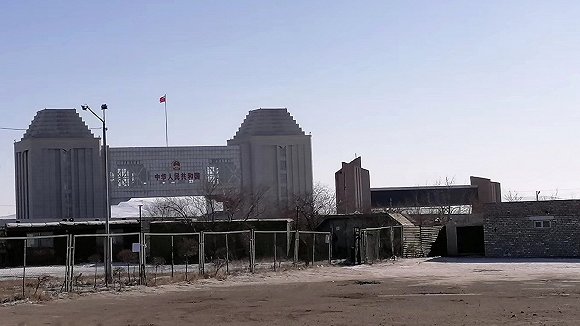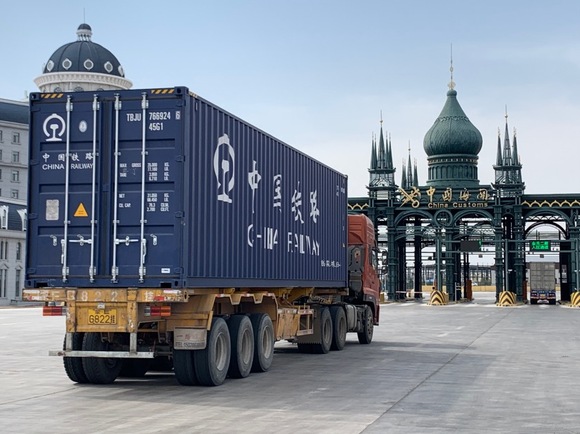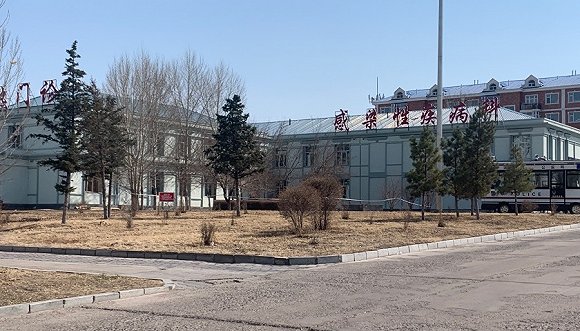Former trade portal Manzhouli, a border city in Inner Mongolia linking China and Russia, has been briefly reborn as a bastion against the pandemic.

The Matryoshka Themed Hotel, a landmark of Manzhouli, has now become a quarantine center.
By CHEN Xin
Some choose to stay. Some are desperate to leave.
Li Dongxu left St Petersburg with 20,000 masks to donate to hospitals in China, but they were eventually seized at the Russian frontier.
Jin Sen took a photo of the border marker after a hectic drive across Siberia, bound for home in Jilin Province.
Zhang Ying, a hospital janitor, chose to stay, as did Duan Hongping, a border control officer.
The Lin family who have lived in the city for 28 years are no longer able to sustain their clothes business and are thinking about leaving.
During the pandemic, at Manzhouli, one of the main staging posts of cross-border trade between China and Russia, many lives have taken unpredictable turns.
Manzhouli’s battle has just begun. It was only when the epidemic became a pandemic that the small city came into the public eye, and the outlook isn’t good, even though close to 100 cases have been prevented from entering China here so far.
Jin Sen and three other Chinese workers left the Russian city of Irkutsk on April 3. They raced through 1800 kilometers of Siberian wasteland, before the ice-covered frozen land thawed into soil and mud. China would not be far away.
Twenty-four hours after departure, the car cruised into the Russian border control area where the four travelers were made to wait only half an hour before a border guard checked their passports and waved them through.
No disinfection, no temperature checks. Despite the biting wind, Jin and his friends were in high spirits and excitedly took photos of the Russia-China boundary marker. During the journey, Jin had repeatedly checked the status of the China border, which was rumored to have shut down. Now they were close to home.
At the same spot, two months before, travel guide Li Dongxu had argued with Russian customs officers for almost ten hours before they finally confiscated his cargo. He had been leading a tour in Murmansk to see the Northern Lights when he heard that Manzhouli hospitals were facing a dire shortage of medical supplies. Doctors and nurses were suffering skin burns from wearing reused masks disinfected in rubbing alcohol. Li drove around every pharmacy and supermarket in the area and bought up all the masks and goggles he could find. “I even drove beyond the Arctic Circle,” he said.
The day before his intended departure, Li’s flight was delayed “indefinitely.” Two days later, he boarded a 32-hour train to Zabaykalsk, on the Russian side opposite Manzhouli. By that time, China had suspended trains into the country. Passengers disembarked in Russia, took a shuttle bus to the border, then walked into China, something even a frequent traveler like Li had never done before.
Li carried his luggage bags of masks and goggles into the customs hall. He had all the paperwork needed for the donation, but a customs officer still flagged up his supplies on the grounds that the amount “exceeded the personal duty-free allowance.” Li vented his frustration on social media, where his friends consoled him that he was “lucky to be able to come back at all,” amid a constantly-changing border situation.

Jin manages a gold mine on the western bank of Lake Baikal. In late January, when China was in the grip of the coronavirus, he thought himself lucky to be shielded from the outbreak by the great distance. The effect of the epidemic, however, eventually rippled through the vast Siberian plain and reached his mine. As a result of the nationwide lockdown, equipment could not be shipped from China. Technicians and migrant workers who had gone home for Chinese New Year were not able to return. But the gold mine operated largely as normal for more than two months before the number of virus cases exploded in Russia. When the husband of a worker tested positive, Jin realized that the threat was now close at hand.
Watching the border situation change, he wavered for five days before he and his colleagues finally hired a Chinese driver for a 8000 yuan ($1100). The driver wanted the money, of course, but was also concerned about the risk. He texted Jin several times after dropping him off to confirm that he was not infected.
Rushing back turned out to be the right decision. The Manzhouli land border was closed four days after Jin crossed. Friends who tried to enter the country after him were all turned away.
The China side was all hands on deck when Jin entered the customs hall, quite a shock compared to the casual attitude he had encountered in Russia. A traveler has to have his temperatures taken and health records checked first. Then he passes on to passport control, takes a nose swab test and a blood test, before being ferried to a central quarantine facility for 14 days observation. All staff who are exposed to the risk live and work under central management and are isolated from Manzhouli residents.
Despite the draconian measures, Jin was relieved to be back. He arrived at the quarantine hotel, took off his dirty clothes, and felt he could finally lay down all the anxieties of the past few hectic days.

Duan Hongping, a customs director at Manzhouli, was on duty the day the border closed. Trade between the two countries had plunged since March, so her main duty became monitoring the body temperatures of travelers. At the end of her last shift, she carefully cut open the seal of her baggy protective suit. Before becoming an everyday essential, these suits were only worn by staff dealing with hazardous material. Duan went through 30 minutes of disinfection, left the customs hall, and headed to the hotel designated for central quarantine. A short time later, her husband arrived and dropped off her pajamas and some snacks at the hotel entrance. The couple chatted briefly separated by the glass door. Duan’s bare chin felt cold after a whole day in a mask.
Zhang Ying, a janitor at Manzhouli People’s Hospital, has also seen her life change. Most imported cases are treated in her hospital, and her workload has become so heavy that she needs painkillers to get through a shift.
Amid a mass resignation of cleaning workers, Zhang Ying actually joined the hospital in March, at the peak of the outbreak. Her children thought she was “out of her mind” to risk her life “for the money.”
Zhang, a breast cancer survivor, feels deeply grateful to the doctors who saved her life. Now, when the hospitals are in need, she wants to give back. Every day, she stays until the last patient leaves and conducts a last round of disinfections.
Zhang’s building is cordoned off with yellow tape and the entrance is barred with a row of iron chairs. Bags of medical waste are piled outside for disposal. Any unwitting patient from another part of the hospital who gets too close is sternly warned away.
“Don’t you see what we are wearing?” a worker yelled from inside the barred window at someone absent-mindedly approaching. “What do you think we are doing here?”
Local authorities are working round the clock to expand Manzhouli’s treatment capacity. Two more local hospitals with a total of 60 beds have been requisitioned. A field hospital with 500 beds is being constructed 30 kilometers from the border. More than a hundred medical workers from neighboring cities have been mobilized and the local Red Cross are on call at all hours. In addition to the local efforts, ventilators and other equipment have been flown there from across the country.

“Look at the quality! I wouldn’t sell it for 500 yuan in normal times! Now I ask 300. But let me tell you, if someone said 200, I’d be more than happy to give it to him.”
For the first time, Lin Geng and his wife, owners of a clothes shop in a Manzhouli mall, fear that they might be forced to give up their beloved business. The couple settled down in the border town in the early 1990s and started exporting clothes. Lin has long become adept in dealing with Russian buyers, but luck has turned against them this year, as it has for countless others.
Lin bought a batch of down jackets before New Year, and four months later, when Manzhouli is basking at a balmy 20 degrees Celsius, very few have been sold.
There are no customers in the mall, which only recently reopened. With no income, but with mortgages of two houses and more than 50,000 ($7000) yuan of overdue store rent, the couple now face the possibility of losing the store they have been running for 14 years.
Business in Manzhouli follows a clear seasonal rhythm. In winter and spring, it’s buyers from Russia who frequent the shops. Then, in summer, big tour groups from China show up on their way to attractions in the Hulunbuir grasslands. The frenzy lasts from June to October and is the most profitable time of the year.
With the Russian border closed, Lin had hoped to shift some of his business to Mongolia, but that border too is now shut. Given the war-like atmosphere at the Manzhouli border, tour groups are unlikely to show up any time soon. Seeing other stores in the same mall shut down one after another, the Lins feel their time is about to come.
Food businesses are also suffering. A hugely popular restaurant now has to repeatedly explain to customers that their Russian chef has never left town since the initial outbreak, thus “couldn’t have been infected in Russia.”
Delivery men spend empty hours on Restaurant Street waiting for orders to trickle in — business has halved even compared to a very quiet March. Some delivery men have left and unemployed locals who previously shunned such a low-paid job are delivering meals to quarantine facilities and hospitals, Lu Keqing among them.
Once a patient called Lu after he dropped off a meal at the hospital to complain that the food was horrible, and the energy that flowed down the phone from the angry patient quite cheered him up! The patient, he said, was at least strong and healthy enough to eat delivery food.
He is not too concerned about his own health. “That depends on the local safety measures, and I have confidence in them,” he said.

Jin Sen is preparing to leave Manzhouli. He has his plane ticket booked. The local disease control authority in his hometown has been in touch, telling him that a staff member will pick him up at the airport and take him to have another swab test. If the result is negative, he only needs to “self-quarantine at home.” He is worried, however, if someone on the plane is sick, he will have to go through another 14 days in central quarantine, at his own expense.
The trip back home has been expensive. With the hired driver, central quarantine paid out of his own pocket, and all the fees for booking and changing his flights, he has spent nearly 10,000 yuan. Many of his friends are stuck in Manzhouli, forced to wait for a chartered bus from their home province amid mass train and flight cancellations.
With the gold mine closed, Jin has lost his income. He wants to take a break and spend more time with his kids. They have been frequently separated due to his working abroad. This feels especially precious after the long journey back.
The border closed, Manzhouli has gradually quieted down. Travelers fresh out of quarantine are leaving, as are suffering business owners like Lin. Frontline workers are still fighting, waiting for whatever lies in store when the border finally reopens.
The question people are asking themselves is not whether tourists will return, but rather when to expect them. In the not too distant future, the signature hustle and bustle of Manzhouli may well be restored.
(Jin Sen, Duan Hongping and Lin Geng are assumed names at the request of the interviewees.)